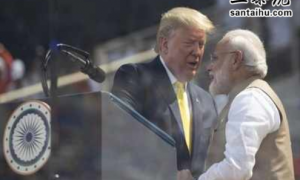The war in Ukraine has reached outer space as Russia and the United States lock horns in flag-waving catfightsin the International Space Station, long heralded as the epitome of international co-operation. this is the second international conflict manifesting itself in space in just over a month. A few weeks ago, the collapse of the Kleo Connect joint venture between Europe and China, aimed at producing hundreds of Low-Earth Orbit satellites, highlighted the fragility of the space domain.
These developments are a timely reminder that the EU’s new multilateral space initiatives are not sufficient and need to be accompanied by a durable framework for cooperation and non-conflictual competition in space.
Outer space is a global commons, which means it is in everyone’s interest that new codes of conduct and treaties are implemented to ensure greater collaboration between states and private space actors. So how do we keep the peace in space while still encouraging healthy competition the fuels innovation? The key lies in smart regulation and strong multilateral consensus. Given the intimate connection between space security and terrestrial security, a simple yet compelling principle must guide space security and inter-state relations down here on Earth: if outer space becomes critically unsafe, it will be unsafe for everyone without exception.
The rules, or lack thereof, that govern space today, are already directly impacting our relations here on Earth. The quest for space supremacy has catalysed the increasingly fraught relations between the U.S., China and Russia, as well as between the UK and the EU, as Brexit forced Britain to leave the EU’s Galileo system.
Competition in the space domain is crucial for the development and improvement of increasingly complex space technologies. However, this unchecked, and potentially conflictual competition, has come hand in hand with an increasingly insecure space frontier. The global race for ever more accurate satellite infrastructure has induced a rise of increasingly hostile cyber operations. The transmission of counterfeit signals, known as spoofing, the intentional interference of signals, known as jamming, hijacking and even direct kinetic attacks are likely to become more frequent as they given the cloak of national security. They are a growing concern for sustainable global security.
Despite its limitations, the Outer Space Treaty of 1967, established over half a century ago, remains the foundation of international space law and is the most important of the UN’s five major space treaties. The lack of a renewed treaty capturing all the technological advancements achieved over the last decades has created a vacuum in the space domain that has been filled by increasing anarchy and narrow unilateral geopolitical goals.
While the 1967 treaty critically prohibits the deployment of weapons of mass destruction in outer space, it does not prohibit the launch of ballistic missiles through space. It also does not prohibit the placement of non-nuclear weapons in space. In short, the treaty does not prevent all forms of escalation, and it leaves many issues unaddressed, particularly in the age of new weapons and cyber technologies. The unwillingness of the signatory parties to develop their space capacities exclusively for “peaceful purposes”, as stipulated in the treaty, has set a precedent for accepting militarised space use, which continues today.
While space infrastructure undoubtedly holds an important role in national defence and security, it also plays a pivotal role in our global economy. Our global communications systems powered by satellites allow us to closely monitor the trillions of dollars’ worth of goods being traded every day. We receive crucial intelligence regarding geological and meteorological developments through our satellites that allow us to thwart natural disasters saving trillions of dollars and thousands of lives in the process. Satellites now also play a decisive role in our ability to monitor and track worrying changes in our climate and environment. More resources need to be allocated into these crucial activities and away from reckless military escalation.
The use of the ISS for national propaganda and the collapse of the Kleo Connect joint venture illustrates that the trust and cooperation needed for rival countries to navigate the space economy are still in short supply. The EU’s new Space Traffic Management initiative aims to develop an EU strategy to ensure the safe and sustainable use of space while preserving the EU space industry’s competitiveness. It is a step in the right direction but it is not enough to defuse tensions in space. Given the critical role of outer space both for civilian and military purposes, a carefully managed, well-regulated and cooperative framework is indispensable moving forward. Gaps in space law, such as over space mining and debris and the role of private actors, will need to be addressed responsibly within international fora with legally binding agreements. Other neglected areas include space debris mitigation, situational awareness and space traffic management rules. The same ethos that spearheaded the successful Nuclear Non-Proliferation Treaty and the Partial Test Ban Treaty must steer our space relations.
Our advanced societies are becoming increasingly and irreversibly overdependent on outer space in our daily activities. Therefore, any disruption or conflict in outer space, intentional or accidental, will be at the detriment of us all. Regulating space is an urgent priority for the global community – it is high time that it is treated as one.







